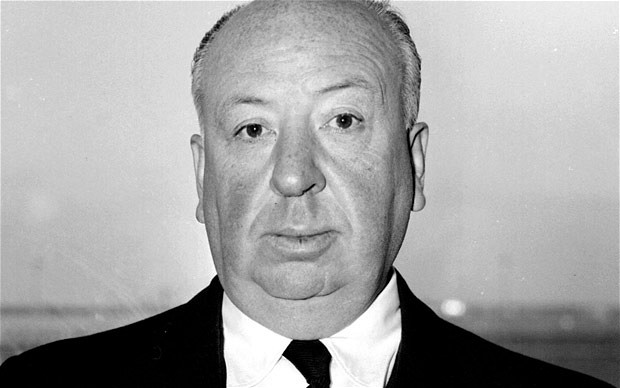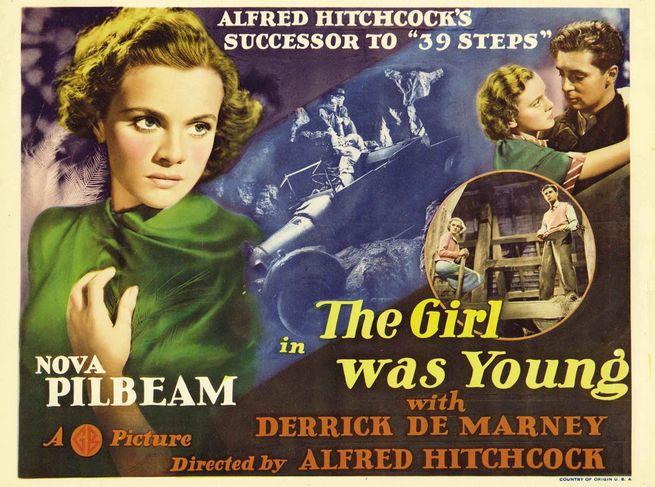The Girl was Young aka Young and Innocent (1937)
 Friday, December 7, 2012 at 9:51AM
Friday, December 7, 2012 at 9:51AM 
The stature of Alfred Hitchcock needs no mentioning here; even non-cinephiles are aware of his status as "The Master". However, while many (including myself) have seen his more recent and popular masterpieces including The Birds, Psycho, Rear Window, Vertigo, and North By Northwest (this set is phenomenal all on its own), many (again including myself here) are sadly ignorant of his extensive library, staring even before 1930. With this in mind (and the recent resurgence in the man's media attention, with two biographical films released this year alone) I take it upon myself to view some lesser known titles in his filmography, and effectually relay them to you dear, dear reader (Mother).
Young and Innocent (AKA The Girl Was Young) (1937)

Being one of his earliest titles, the fact I had not previously heard of it, and that it was available on that red streaming service so many of us use (I'm a servant to its will), it seemed appropriate to start the series with this gem from 1937. Showcasing burgeoning talent maturely developed in his later films, Hitchcock directs a fairly entertaining murder mystery with humor and romance thrown in for good measure.
The piece starts with an ostensibly married couple arguing and threatening one another (beautiful opening shots of each character walking right up to the camera and then retreating, as if acknowledging the audience for 5 seconds and informing them the ride has just begun) before cutting to a beach where a body lay. Robert Tisdall (played by Derrick De Marney) approaches and, seemingly knowing the dead woman from the previous scene (yep, didn't survive long) subsequently panics and flees, only to be seen by two woman approaching. Naiveté, lack of an alibi, and a plethora of beautiful cuts later, Tisdall finds himself arrested for the murder. Luck strikes when through a series of happy accidents he escapes, also making an attractive yet cautious impression on the local constable's daughter Erica Burgoyne (played effectively innocent by Nova Pilbeam). Together this odd couple sets out to prove Tisdall's innocence, which of course is completely valid...I mean I've seen enough Murder, She Wrote to know...right?
While the story itself may appear predictable especially when considering the modern viewer's expectations for surprise, the joy here is in the atmosphere and details (it also isn't completely predictable). I do not (yet) have a Ph.D. in Hitchcock as implied by the opening paragraph, but I will go out on a ledge here to say that this may be one of his more lighthearted and enjoyable filmic romps. The two main characters share a unique chemistry, acting as opposites which helps to build not only a realistic relationship but also sensual tension (the cop's daughter can't help but be attracted to the "Forbidden Fruit") that permeates throughout enjoyable mishaps and close calls. The vitality and drama are also present as moments occur where all hope does look lost, and even thought the scope appears fairly minute and simplistic we are treated to moments where the stakes are anything but low. All the while we are also entertained by a comedy of errors and mistaken interpretations, arguably unseen in many of The Master's works (sans The Lady Vanishes; it may not be discussed in this series but please do check it).
As you can see by the career timeframes I've presented you (Young and Innocence = 1937, Psycho = 1960) Hitchcock had a truly exceptional career of quality and quantity. The fact that you can see details and traits in this early work and 30 years in the future cement his auteur status: an ending where success for the protagonists is almost lost, fully structured and developed composition (The Master was reportedly all about storyboarding even before it was commonplace), smooth shots and transitions throughout, extreme (and lush) closeups, and a cameo by the director himself (an exciting trademark done in various capacities throughout his filmography). Its worth noting that the director was in his 38th year of life when this film was released, yet continued his unique and innovative style (arguably changing only in regards to maturity) through his 68th year.
While many (again, me here; always have to align my conceited self with the majority) dislike certain classics for the consistencies in tone and style aligning them with an arguably "old" quality, this 75-year-old film showcases a freshness in visuals, technique, and dialogue unlike any other films of the period my novice soul is familiar with. Again, the mystery at hand may carry irony for its obvious nature (maybe this is sleight of hand?) but the tale is a delectable early work that can be appreciated for almost all other aspects.
Check it on that "streaming" thingy right away; if you dig, go check The Lady Vanishes next. Tune in next week for one of the Master's silent types...



Reader Comments